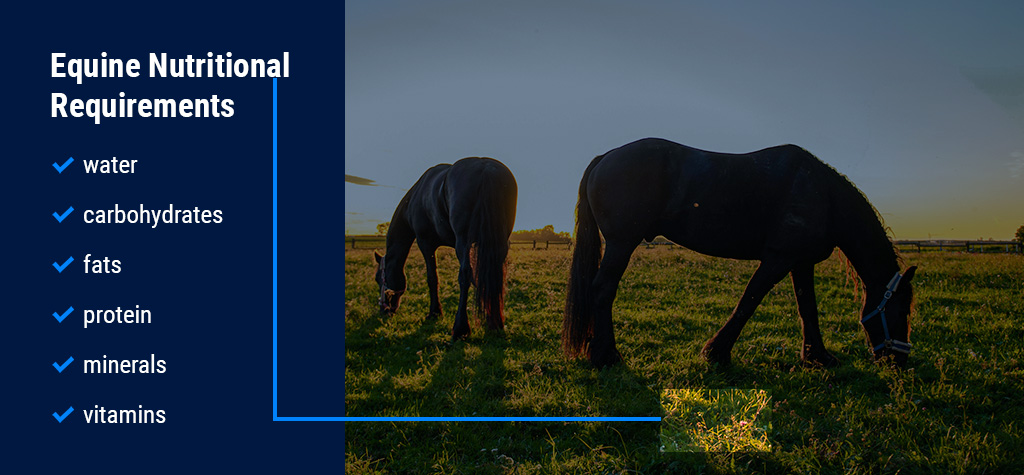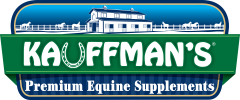Proper Nutrition in Horses
Nutrition is both simple and complex. On the straightforward side, nutrition acts like gas in a vehicle. With it, a living being can operate, and without it, they can’t. But there are many nuances. Just like a vehicle, the type of fuel you use makes a difference in performance. For best performance, the quality, type and amount must match the needs of the vehicle or living being.
Table of Contents
- Food, Nutrition & the Equine Digestive System
- Equine Nutritional Requirements
- Factors That Affect Equine Nutritional Needs
Horses require a variety of essential nutrients to support proper body function. As you refine your horse’s feed, you can work to promote optimal health that fuels normal performance. The way you supply the necessary nutrients may vary depending on your horse’s needs and your location. Examining the systems and requirements that underpin nutrition can help you fine-tune your horse’s diet and support full wellness.
Food, Nutrition & the Equine Digestive System
The way a horse’s body evolved to digest food in the wild significantly impacts their nutritional needs. Horses are forage eaters and may graze for 10 to 17 hours a day in the wild. To support this instinct, a horse’s digestive system is built for the continual intake of food. As a horse grazes, its stomach processes the small amounts of food and passes it to the large intestine, where the maximum amount of nutrients are extracted.
Extracted nutrients serve some of the following functions within a horse’s body:
- Source of energy
- Component of body structure
- Support chemical reactions in the body
- Transport substances
- Regulate body temperature
- Influence feed’s palatability
Given these processes, forages are a foundation to a horse’s diet. They satisfy the equine grazing need while also providing the fibrous nutrition to support health. To see the full picture, let’s take a deeper look at the nutritional breakdown your horse needs.
Equine Nutritional Requirements

A nutrient is any feed component that is necessary to support life. There are six nutrient classes that are essential for your horse’s health. Each category is required in proper proportion to ensure a balanced and effective diet.
1. Water
A horse’s body is made from 70% to 75% water. This water helps regulate the horse’s body temperature and metabolism. As a horse sweats, hydration is key to help replenish the water. In ideal conditions, most horses will drink from five to 15 gallons of water per day. In general, a constant supply of clean drinking water is appropriate for maintaining proper hydration throughout the day.
Factors that affect a horse’s water needs include:
- The horse’s size
- The environmental conditions
- The horse’s workload
- The amount of feed the horse consumes
2. Carbohydrates
Carbohydrates are the source of most of your horse’s energy. In addition to energy, carbohydrates offer fiber that supports health in the large intestine. Carbs can be divided into two main categories:
- Non-structural carbohydrates: Includes starch, glucose and pectins from grains, gums and fiber. A horse’s body uses non-structural carbs as energy by breaking down the substances into glucose and simple sugars. The small intestine then absorbs them for energy.
- Structural carbohydrates: Includes cellulose and hemicellulose from plants. Bacterial enzymes in the colon and cecum break down structural carbs and convert them into volatile fatty acids. Volatile fatty acids are the source of 30% to 70% of a horse’s energy.
3. Fats
Fats provide energy in a higher concentration than carbohydrates. In fact, fats are 2.25 times more energy-dense than carbs. Fats also contribute to the following functions:
- Cell membrane health
- Absorption of fat-soluble vitamins
- Providing fatty acids like linoleic acid
For some horses, fat can provide more energy without increasing the amount of feed they eat. While the National Research Council’s nutrient requirements do not specify fat requirements for horses, research shows that horses can handle up to 20% fat in their diet.
4. Protein
Horses require protein for the amino acids it provides. Amino acids help support muscle and ligament structure and provide energy. Approximately 8% of a horse’s diet should consist of protein. There are 10 crucial amino acids a horse should receive from their food:
- Valine
- Tryptophan
- Threonine
- Phenylalanine
- Methionine
- Lysine
- Leucine
- Isoleucine
- Histidine
- Arginine
There are also 12 additional amino acids that are produced in a horse’s tissues and do not have to be consumed in their diet.
5. Minerals
Minerals are inorganic elements that contribute to a variety of essential body functions. Minerals help to maintain and develop a horse’s muscle, bones and ligaments as well as facilitate energy transfer. Many minerals come from a horse’s feed, but mineral content may vary based on the type of feed and its soil conditions.
A horse’s mineral intake consists of two categories: macrominerals and microminerals. The following are macrominerals that are necessary in larger amounts:
- Calcium
- Chloride
- Magnesium
- Phosphorous
- Potassium
- Sodium
- Sulfur
The following microminerals are only necessary in trace amounts:
- Cobalt
- Copper
- Fluorine
- Iodine
- Iron
- Manganese
- Selenium
- Zinc
6. Vitamins
Vitamins help support essential metabolic processes and overall health in your horse. Necessary vitamins exist in fat-soluble and water-soluble varieties. Fat-soluble vitamins include vitamins A, D, E and K. The body uses fat to help absorb these substances within the small intestine. Vitamin C and B Vitamins are water-soluble, which means the horse can produce them internally. A balance of fat-soluble and water-soluble vitamins helps keep your horse in optimal health.
Factors That Affect Equine Nutritional Needs
While all six nutrients are essential, your horse’s needs may vary based on their circumstances, including elements within the horse and their environment. Consider the following factors when assessing your horse’s dietary needs:
- Horse’s workload
- Horse’s status — pregnant, working, retired, etc.
- Quality of the available food
- Type of available food
- Horse’s age
- Horse’s weight
Whether you provide roughage like hay and a grass pasture or concentrates like small grains, it’s important to understand the nutrients your feed contains. While a horse’s diet is just one component of wellness, aligning feed nutrients to your horse’s individual needs can help you promote optimal health.
